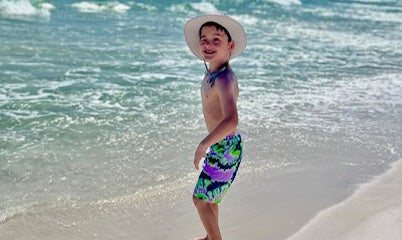Neuroblastoma
Being born at 25 weeks was just the first challenge for Graham Donahue. He subsequently spent months in a neonatal intensive care unit (NICU) in Montgomery, and even after being released, he had trouble with excessive vomiting—more than normal for an infant. That led his parents, in the summer of 2016, to take him to Children’s of Alabama. His ultimate diagnosis was something that rocked their world: Graham had neuroblastoma.
The journey began when Graham’s doctors discovered an unknown mass on one of his kidneys. They determined they needed to remove the mass, so they scheduled surgery for a month later. Graham’s surgeons came out of the operating room and said the mass was gone. The Donahues celebrated that Graham’s mass had miraculously vanished. During a follow-up appointment a few months later, though, Children’s pediatric urologist Dr. David Joseph found another mass. This time, it was cancerous.
Graham’s father was deployed in the Middle East when he received this earth-shattering news. He flew home on emergency leave. After testing, appointments and a biopsy, doctors informed the Donahues in November 2018 that Graham had stage three neuroblastoma.
Removing the tumor was too dangerous, so Graham underwent chemotherapy to shrink it. After two rounds of chemo, his tumor had shrunk by 40%. The following year, Graham had his tumor removed during a procedure with a surgeon in New York. Children’s declared Graham cancer free in March 2019.
Though Graham was no longer fighting cancer, his journey with Children’s didn’t end there. He would go on to receive continual bloodwork, echocardiograms on his heart, and hearing and cognitive tests. He started preschool on time and was able to carry on being a young boy.
After five years as a patient at Children’s, Graham’s doctors transferred his care to the Children’s of Alabama Taking on Life after Cancer (TLC) Clinic, a lifelong clinic that specializes in helping childhood cancer survivors lead healthy lives after treatment. The primary goals are providing care that is tailored to their unique needs, preventing problems from happening, and catching problems early, when they are most easily treated. For the last two years, Graham has been a patient of the clinic, which offers medical care, health education, psychosocial support, and assistance with other issues, such as challenges at school or at work. “The team at the TLC clinic has been so helpful to us since we started going there,” Graham’s mom, Katie, said.
Graham, now 8 years old, is in second grade and enjoys soccer, playing with Legos, swimming, taking his dogs on walks and playing Minecraft. He’s fully in remission, and Katie says he inspires his parents every day.
“Graham’s whole existence has changed the way we look at life,” she said. “He is so resilient. You would think that the personality and outlook of someone who has been through the hard things he has been through would change, but it hasn’t changed Graham.”











